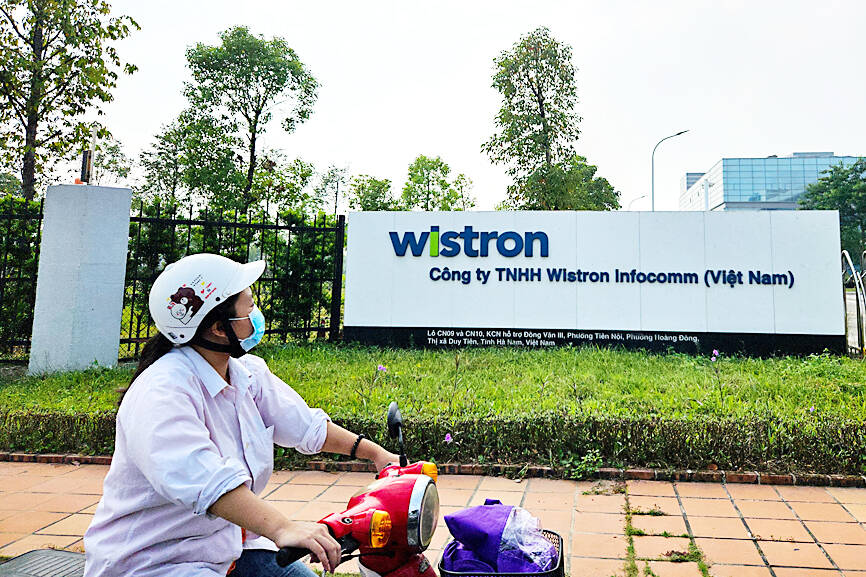Electronics maker Wistron Corp (緯創) yesterday said it is shipping artificial intelligence (AI) server racks based on the newest Blackwell chip from Nvidia Corp this quarter, which would be a new growth engine to propel the company’s revenue contribution from AI-related devices and servers next year.
Wistron has been supplying AI-related products to Nvidia since 2017, and has now become a supplier of the AI server racks.
“We are seeing the rack business start to grow. We focus mostly on enterprise customers, while Wiwynn Corp (緯穎) concentrates on cloud service providers,” company president Jeff Lin (林建勳) told a virtual investors’ conference yesterday.

Photo: Reuters
Wiwynn is an AI server manufacturer and is 37 percent owned by Wistron. Wistron expects AI-related products and servers to account for more than 50 percent of the company’s revenue next year, compared with 40 percent this year, Lin said.
“The AI and server businesses have been growing. We are looking at quite good growth next year,” Lin said.
For Wistron alone, revenue from AI products — graphic processing unit (GPU)-based AI servers, GPU accelerator cards, AI modules and AI systems — would more than double from this year, Lin said.
AI products make up a double-digit percent of Wistron’s revenue so far this year on a non-consolidated basis, and the business is still growing each quarter, he added.
To cope with rising customer demand, Wistron is building a new AI server manufacturing facility in Hsinchu, which is to enter production in the first quarter of next year, Lin said.
A new production line in Mexico would also be ready for production of AI servers soon, he added.
Other than that, Wistron operates manufacturing sites in Vietnam, Malaysia and the Czech Republic, where it assembles PCs and industrial devices, the company said.
Non-China manufacturing sites rose to make up more than half of its total revenue, Wistron said.
The company is not ruling out the possibility of making AI servers in the US, despite intensifying trade frictions with China, company chairman Simon Lin (林憲銘) told investors.
“We are facing an ever-changing environment. The whole situation is perplexing. We have not seen any alleviation in geographical tensions,” Simon Lin said.
With strong resilience in operations, Wistron said it did not expect a significant impact from the incoming administration of US president-elect Donald Trump, Simon Lin said, citing the company’s global manufacturing footprint and operational agility.
Wistron said it is optimistic about its business and the whole year of 2024.
“We believe we will produce a quite good result this year. And we are confident about the growth next year,” Jeff Lin said.
Net profits surged 49.2 percent annually to NT$12.13 billion (US$372.17 million) during the first three quarters, compared with NT$8.13 billion, while earnings per share jumped to NT$4.26 from NT$2.9, the company’s financial statements showed.
Revenue grew 18.2 percent year-over-year from NT$636.52 billion to NT$752.07 billion during the January-to-September period, thanks to growth in AI-related products.
Operating profit margin improved from 2.65 percent to 3.6 percent.
Wistron said it expects operating profit margin to rise next year from this year.

BIG BUCKS: Chairman Wei is expected to receive NT$34.12 million on a proposed NT$5 cash dividend plan, while the National Development Fund would get NT$8.27 billion Taiwan Semiconductor Manufacturing Co (TSMC, 台積電), the world’s largest contract chipmaker, yesterday announced that its board of directors approved US$15.25 billion in capital appropriations for long-term expansion to meet growing demand. The funds are to be used for installing advanced technology and packaging capacity, expanding mature and specialty technology, and constructing fabs with facility systems, TSMC said in a statement. The board also approved a proposal to distribute a NT$5 cash dividend per share, based on first-quarter earnings per share of NT$13.94, it said. That surpasses the NT$4.50 dividend for the fourth quarter of last year. TSMC has said that while it is eager

‘IMMENSE SWAY’: The top 50 companies, based on market cap, shape everything from technology to consumer trends, advisory firm Visual Capitalist said Taiwan Semiconductor Manufacturing Co (TSMC, 台積電) was ranked the 10th-most valuable company globally this year, market information advisory firm Visual Capitalist said. TSMC sat on a market cap of about US$915 billion as of Monday last week, making it the 10th-most valuable company in the world and No. 1 in Asia, the publisher said in its “50 Most Valuable Companies in the World” list. Visual Capitalist described TSMC as the world’s largest dedicated semiconductor foundry operator that rolls out chips for major tech names such as US consumer electronics brand Apple Inc, and artificial intelligence (AI) chip designers Nvidia Corp and Advanced

Saudi Arabian Oil Co (Aramco), the Saudi state-owned oil giant, yesterday posted first-quarter profits of US$26 billion, down 4.6 percent from the prior year as falling global oil prices undermine the kingdom’s multitrillion-dollar development plans. Aramco had revenues of US$108.1 billion over the quarter, the company reported in a filing on Riyadh’s Tadawul stock exchange. The company saw US$107.2 billion in revenues and profits of US$27.2 billion for the same period last year. Saudi Arabia has promised to invest US$600 billion in the US over the course of US President Donald Trump’s second term. Trump, who is set to touch

SKEPTICAL: An economist said it is possible US and Chinese officials would walk away from the meeting saying talks were productive, without reducing tariffs at all US President Donald Trump hailed a “total reset” in US-China trade relations, ahead of a second day of talks yesterday between top officials from Washington and Beijing aimed at de-escalating trade tensions sparked by his aggressive tariff rollout. In a Truth Social post early yesterday, Trump praised the “very good” discussions and deemed them “a total reset negotiated in a friendly, but constructive, manner.” The second day of closed-door meetings between US Secretary of the Treasury Scott Bessent, US Trade Representative Jamieson Greer and Chinese Vice Premier He Lifeng (何立峰) were due to restart yesterday morning, said a person familiar